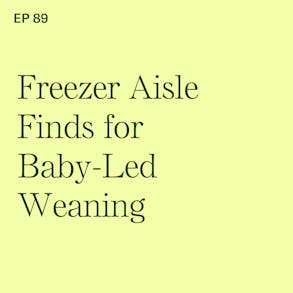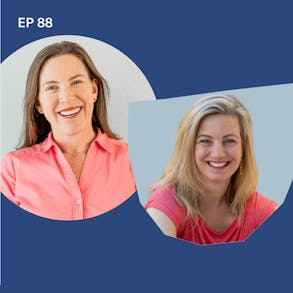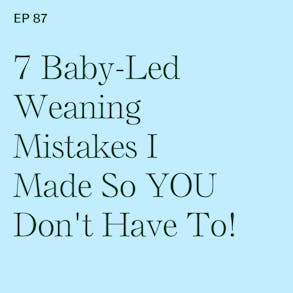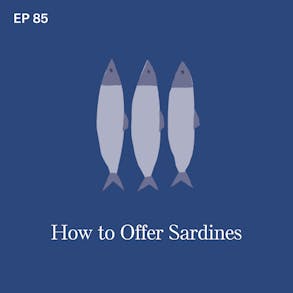Are Plant-Based Milks Safe for Babies?
In this episode we're talking about:
- Why some toddlers can't drink milk and if you can't drink milk which are good milk alternatives once the baby turns 1
- How to read a nutrition facts panel and what nutrients to be mindful of for added sugars, salt, fat and protein
- What to do if your baby can't drink milk and you want to try a milk alternative like pea milk, soy milk, oat milk, coconut milk or rice drink

LISTEN TO THIS EPISODE
Episode Description
Can babies drink plant based milks? And what are the best plant based milks for toddlers? In this episode we’re looking at the pros and cons of soy milk, pea milk, almond milk, rice drink, coconut milk and oat milk for children. We don’t substitute fluid cow’s milk or milk alternatives in place of infant milk prior to 12 months of age…but for families who don’t or can’t drink cow’s milk this rundown of plant-based milks will help you choose an alternative for use after your baby turns 1.
Links from This Episode
- Baby-Led Weaning with Katie Ferraro program with the 100 First Foods™ Daily Meal Plan, join here: https://babyledweaning.co/program
- Baby-Led Weaning for Beginners free online workshop with 100 First Foods™ list to all attendees, register here: https://babyledweaning.co/baby-led-weaning-for-beginners
Other Episodes Related to this Topic
Other BABY-LED WEANING MADE EASY podcast episodes about cow’s milk / plant-based milks mentioned in this episode:
- Episode 275 Soy: 3 Ways to Introduce Soy to Babies (…and why soy milk is not one of them) https://blwpodcast.com/episodes/275
- Episode 208 - Heavy Metals in Baby Food with @consumerreports James E. Rogers, PhD https://blwpodcast.com/episodes/208
- Episode 135 - Toddler Milks: Why You Don't Need to Buy These Formulas https://blwpodcast.com/episodes/135
- Episode 113 - Transitioning to Cow's Milk: How Do I Do This? https://blwpodcast.com/episodes/113
- Episode 79 - How to Pick a Milk When Your Baby Turns 1 https://blwpodcast.com/episodes/79
- Episode 13 - Milk Protein: How to Introduce Your Baby to this Potentially Allergenic Food https://blwpodcast.com/episodes/13

Latest Episodes






Katie Ferraro (0s):
And for me, the most infuriating part about pea milk is if you look at the website of the most prominent pea milk brand and their kids' pea milk, they have cherry picked the nutrients they think you wanna know about. And then they've hidden the actual Nutrition facts panel, which shows that the kids' product has added sodium and added sugar, at which point this would not be a product that you would want to offer to your toddler as a fluid milk alternative. Hey there, I'm Katie Ferraro, Registered Dietitian, College Nutrition Professor and Mom of seven specializing in baby led weaning Here on the Baby led weaning Made Easy podcast, I help you strip out all of the noise and nonsense about feeding, leaving you with the confidence and knowledge you need to give your baby a safe start to solid foods using baby led weaning.
Katie Ferraro (47s):
Well, hello there. Welcome back. Today we're talking about plant-based milks and are they safe for babies? Now, safe versus something you would want to offer baby are probably two separate topics but in this episode I wanna go through some common plant-based milks that are available on the market today and then analyze what is either in them or not in them and then how that kind of plays into the bigger picture of what's happening with your developing child. Now this is a conversation primarily for parents and caregivers of older infants who will be making the transition around the one year mark off of formula. So if you're buying and feeding commercial infant formula, and then you'll be going onto cow's milk or possibly a milk alternative.
Katie Ferraro (1m 27s):
Now if you're breastfeeding, you and your baby may continue to want to do that past one, which is wonderful if that works for you. Some of you listening might be like, I am done. You might already be done. You might be done at the one year mark and maybe you will be looking for info on making the transition to non infant milk around that 12 month mark. Now I like to start out each of these Mini baby led weaning training episodes with a BLW tip of the day. And today's tip is, please remember we do not substitute fluid cow's milk or a milk alternative in place of infant milk for Babies prior to 12 months of age. Okay, so breast, milk and or formula collectively that's what we call infant milk. Infant milk is sufficient to meet your baby's needs for the first six months of life.
Katie Ferraro (2m 10s):
Then when you start the weaning process, whereby between six and 12 months of age, you're working your baby from going from a 100% infant Milk diet at six months to whereby at 12 months of age we like to see most of baby's nutrition coming from food. So you're gradually weaning off of milk. But at the 12 month mark when you make that transition, especially if you're formula feeding to a non infant milk, you might be very overwhelmed by all of the different options that are out there. Now I do have a few other episodes that if this whole idea of Transitioning to milk is new for you that you'll definitely want to listen to. Okay. When we talk about the context of Milk alternatives, it's generally the case that the children for whom the Milk alternatives are most appropriate for are usually in two cases.
Katie Ferraro (2m 58s):
One, if the child has a cow's Milk Protein allergy, right? If you have a cow's Milk Protein allergy, the therapy is to avoid cow's Milk Protein, at which point you could not switch to cow's Milk at 12 months if the family is vegan or chooses not to consume animal foods. That's another reason why cow's Milk might not be a desirable option for those families. Now, if you are in the vast majority of people who will be making the transition to cow's Milk, be sure to listen to episode 113. It's all about "Transitioning to cow's, Milk, How, Do, I, Do This." And also in episode 79, "How to Pick a Milk When Your Baby Turns one I cover some of the plant-based Milk and some of the differences between cow's Milk" in that episode. And then lastly, if you're feeling pressure or any inclination to purchase or utilize Toddler Milks or Toddler Formulas oftentimes also called follow on Formulas - episode 1 35 is really important.
Katie Ferraro (3m 50s):
It's called "Toddler Milks and why you do not need to buy these Formulas. " So I will link up all of the other Milk and Milk alternative related episodes in the show notes for this episode, which you can find at BLW podcast.com. Now, I have to be honest myself, I was confused as a first time mom, even though as a dietician I'd always heard the message, no Milk for Babies before 12 months of age. And then you start learning about Allergenic food introduction, you're like, hold up. I'm supposed to be introducing cow's Milk Protein to my baby at six months of age. I thought they weren't supposed to have cow's. Milk So. It kind of ties back into the tip, which is no fluid cow's Milk in place of infant Milk prior to 12 months of age because it's not nutritionally appropriate. However, we definitely wanna be introducing your baby to that cow's Milk Protein allergy or the potentially Allergenic food early and often.
Katie Ferraro (4m 38s):
And so if you haven't done any cow's Milk, well also just heads up, if you're feeding infant formula, you've successfully introduced your baby to cow's Milk because cow's Milk Protein is the base of infant formula. But if you've been exclusively breastfeeding, you might be looking for information on how to introduce your baby to cow's Milk, Protein and I have a great episode for you. If you go way back in the podcast, it's one of the first Allergenic foods we did back in episode 13 that's called "Milk Protein: How to Introduce Your Baby to this Potentially Allergenic Food". I kind of explained that nuance there, like yeah, we don't feed cow's Milk in place of the infant Milk, but we definitely want to be offering cow's Milk and I give you some ideas on how to do that.
Katie Ferraro (5m 20s):
So let's fast forward. You're getting close to the 12 month mark. You're either I'm done breastfeeding or I wanna stop buying formula and I'm not gonna do cow's Milk either cuz the baby has a cow's Milk Protein allergy or we just decided not to. In many cases, that's for vegan families. There might be a lot of other reasons why you decide not to do cow's Milk. People always say, what do you feed your kids? I'm a mom of seven, we have no cow's Milk Protein allergy in our household and we don't have any vegan vegetarian considerations or religious reasons why we would not be eating cow's Milk foods. And so we drink whole Milk cow's Milk starting at 12 months of age. So that's what we do. But again, Milk is a a very controversial topic and what works for one family or is desirable for one family might not be for the other.
Katie Ferraro (6m 2s):
So I just wanna run down some of the Milk alternatives for you today. We're gonna cover soy, Milk, pea milk, almond milk, rice Milk, coconut Milk, and oat Milk. I'll just tell you a little bit about each one in case you are considering them. And I'll start with soy Milk, which if you don't have time to listen to the whole episode, spoiler alert, soy Milk is gonna be your best alternative. Okay? To cow's Milk pros about soy Milk. Okay? Soy is the only plant food that contains all nine essential amino acids that are easily absorbed by the human body. Okay? So you might have heard of complete versus incomplete proteins. Complete proteins are almost exclusively found in animal foods. And the incomplete proteins mean they lack at least one or more of the essential amino acids, which are the building blocks of Protein soy.
Katie Ferraro (6m 44s):
However, as a plant food is very unique in the sense that it is a complete Protein, okay? Now, there are lots of other ways that toddlers get Protein and I've worked with families who consume absolutely no Milk or Milk alternatives and their child is fine, right? Why do we offer Babies or toddlers rather cows Milk because a little bit of fat, they're still developing brains even though it's a high fat food. And we offer the full fat Milk products, just so you know, up until age two there's a lot of water in there. So there's a hydration factor, there's calcium, there's vitamin A and vitamin D, okay? But you can get vitamin A and vitamin D and calcium and Protein from other sources. I have a friend who's a dietician and she has two girls and she likes Milk, but for whatever reason, her girls just didn't like cow's Milk and they've never had it.
Katie Ferraro (7m 24s):
And she's like, I just buy soy Milk so I have something to put on cereal. But for the most part, they don't just drink cups of Milk, they drink water and then they get their Nutrition. They, they like yogurt and they have cheese and there's other sources of Nutrition. So you don't have to be pumping your child full of any sort of Milk product by any stretch of the imagination because it is possible and we should be getting most of the Nutrition from food. So the, the Milks and the Milk alternatives are just kind of, I like to think of them as like a little bit of a, an afterthought. But after age one, most of baby's Nutrition is coming from food and not from Milk. So really this is an important topic to some degree, but it's not super important what your baby eats is significantly more important than what they drink after the 12 month mark. Hey, we're gonna take a quick break, but I'll be right back
2 (8m 10s):
At a time when change is constant and we are pulled in far too many directions. We need a way to stay present to life and to increase our ability to remain calm, think clearly, and maintain our wellbeing. Many studies indicate mindfulness improves our mental, emotional and physical health. On a Mindful Moment with Teresa McKee, you can learn how to practice mindfulness and enjoy its many benefits. Tune in for guided meditations and to hear tips and advice from some of the most respected experts in the fields of mental health and mindfulness. The world truly can be a better place.
2 (8m 51s):
It all starts with a Mindful Moment.
Katie Ferraro (8m 58s):
So back to soy, the pro is that it is a complete Protein, okay? Contains all of the essential amino acids cons, okay? There are a lot of soy Milks out there that have added sugar in them. And you're gonna hear like Katie your broken record. Every single one of these, you're like, there's added sugar. But remember the recommendation from the American Academy of Pediatrics and I fully agree with this, try to avoid offering added sugars prior to two years of age. Okay? So if you're looking at a product and you look at the added sugars line, it should say zero grams whole Milk, cows Milk, zero grams of added sugar. You can buy soy Milk that has a significant amount of fat and does not have any added sugar. So that's why I like soy. Now, soy, as you might be aware, is one of the potentially Allergenic foods.
Katie Ferraro (9m 40s):
That's not a problem, but I don't use soy Milk as a way to introduce soy to Babies. You go back to episode 285, it was called soy. Three ways to Introduce Soy to Babies and Why Soy Milk is not one of them. I go into it, but the long and the short of it is the amount of Protein and soy Milk that the baby would actually be consuming is not significant or is not enough to really constitute the offering of that potentially Allergenic food. Okay? It's not realistic that your six month old is gonna sit down and drink eight ounces of soy Milk. And even if they could, I don't want them to because that takes that very valuable room in their stomach that they need that infant Milk for. So I like soy Milk. If you absolutely cannot do cow's Milk, and I'm not ranking the rest of these, I'm just saying soy is the one that I prefer the rest of them, I do see some drawbacks with most of the options.
Katie Ferraro (10m 22s):
So Pea will do the next one. Pea. If you're looking at pea milk, the Protein and pea milk, it's also in not complete, okay? It's an incomplete Protein, not a huge deal, right? Coz your child can be eating other sources of Protein and you eat a variety of foods, you're naturally gonna be combining all of those amino acids, okay? Pea milk on its own, not a good source of calcium, okay? Like a lot of these products, it's gonna be fortified. So you always need to make sure you're looking for a fortified product. And then because peas are not a good source of fat, they end up adding vegetable oil into the Pea. Okay? So you have to look carefully at the ingredient list and see what types of oils are there and whether or not that's something you would want in your child's body or not. I was looking in researching this episode at one of the most popular nationally available brands of pea milk and they have a kids line.
Katie Ferraro (11m 5s):
And what is so incredibly frustrating is if you look on their website and you click on the kids product and then you click on the Nutrition information, they do not disclose, they don't divulge the full Nutrition fax panel. They cherry pick the nutrients that they think parents want to see and they hide the nutrients that parents don't wanna see. What do we wanna avoid for small children? Added sugars and sodium. What does the kids product of pea Milk have added? Sugars and sodium you have to go to. Like if you're just looking online, if you don't have the actual product, I always just go to Amazon and then click on the product. And then Amazon always shows you like the full 360 of the product. And then you can zoom in and see the actual Nutrition facts panel that the FDA mandates that you put on the product, not the cherry picked pick and choose that the brand wants to put on their website.
Katie Ferraro (11m 49s):
And there you can see, oh look, there's five grams of added sugar in a serving of this kid's product. If it is a product that we're serving to some, a child less than two years of age, we don't want any added sugars in it and so therefore I would not go with pea milk. You can find other ones though. It's funny coz there's ones that actually don't have added sugar. They all do have some added sodium, but there are some without added sugar, that would actually be more appropriate for kids that have a higher level of fat, but they're not marketed as being for kids. So just always be wary of the products that are marketed as kids. A lot of times it's just this idea of like a value added proposition that the manufacturer's gonna sell you a higher priced product coz you think it's more nutritionally attuned for your baby. But as you know, doing baby led weaning, you don't have to buy baby foods, you don't have to buy kids foods.
Katie Ferraro (12m 33s):
You can get your child to eat just modified versions of the same foods, of course, that the rest of the family is doing. So if you guys drink pea milk, just choose the one without added sugar. It's not the kids one though. All right, next up is almond milk. Almond milk Pro. Kind of hard to find anything. Let's just skip to the cons. Basically, there's no Protein in almond milk, right? A Cup of cows. Milk has eight grams of Protein. A Cup of almond milk has one gram of Protein mentioned. Okay? There's other places that your baby could be getting Protein, but sometimes parents will ask, well, can I do almond milk as a way to introduce my baby to the potentially Allergenic food tree nut? And the answer is no. Again, because the Protein part of the Allergenic food, in this case, the Trina and almond would be the one that we're selecting. The Protein part is the one that could potentially cause the Allergenic reaction.
Katie Ferraro (13m 13s):
And through the processing of almonds into almond milk, almost the entirety of the Protein is removed. That's why there's such a small amount of Protein left in one Cup of almond milk. Also, almond milk oftentimes have added salt. They have all these thickening agents, they have different ingredients that you can't pronounce in many cases. Is that something you want in your child's body? They also tend to have a higher oxalate content. So if consumed in excess could be problematic for people with, you know, underlying kidney stones, most children of course wouldn't have that. But there's basically not a lot of Nutrition in almond milk. And the type and the flavors that most people end up buying are the ones that have added sugars, which again are inappropriate for your baby. All right, let's move on to Rice Milk again. Rice Milk is really only for people with like severe allergies who cannot tolerate anything else.
Katie Ferraro (13m 54s):
So if you're nut-free, dairy-free, soy-free, rice Milk might be an option. But the con of course is that the potential for arsenic in rice foods. So if you are not yet familiar, rice tends to preferentially pick up arsenic, a heavy metal at much higher quantities than other crops do. So back in episode 208, we had Dr. James E. Rogers. He is the head scientist at Consumer Reports. He came on to talk about this problem of heavy metals in foods that Babies eat. And we talk a lot about rice foods and limiting rice foods. And so I'm always confident in the consumer reports recommendations. They recommend no rice Milk for children under age five, and even then only at a half a Cup per day. There's almost no Nutrition in rice Milk.
Katie Ferraro (14m 35s):
It's not even called rice Milk. It's called rice drink. Okay? There's no Protein, there's no calcium, there's no vitamin D, and the potential for arsenic, definitely a no go for children. Hey, we're gonna take a quick break, but I'll be right back
3 (14m 51s):
Behind every work of art, there's a story. Okay, sure, it sounds kind of obvious when I say it like that, but think about it. How many times have you stood in an art museum, maybe with a date or with your mom looked at an artwork and thought, I don't get it. I'm Amanda and I know the feeling all too well. To me, knowing the story behind an artwork is a huge part of knowing how to look at it and appreciate it. And on my podcast Art of History, that's exactly what I share with you. In each episode, we view history through the lens of some really great works of art. There is so much we can learn about the people and things, which someone way back when deemed worthy of recording for posterity.
3 (15m 35s):
And let me tell you on the podcast, we have barely scratched the surface. Join me as we dive deep into the bigger picture behind some familiar and maybe not so familiar works of art, no prerequisites required. Check out art of history wherever you get your Podcasts.
Katie Ferraro (15m 56s):
What about coconut Milk? I love coconut Milk as a way to introduce your baby to coconut, but we don't use it in place of fluid cows Milk, unless, I mean, I've never even heard of anyone doing that because it's not really something that is even nutritionally equivalent, right? And with coconut Milk, the reason why I like coconut Milk for Babies to introduce in very small quantities is because it's a thick liquid, right? You get a can of unsweetened coconut Milk or coconut cream. It's a nice thick liquid that's easy for your baby to drink. Plus like making actual foods with coconut can be really challenging. It's, well, obviously a pain to crack it's scoop the flesh out of actual coconuts and then soften it to make it safe for Babies to eat. Not to mention that most of the flaked or shredded coconut that you buy at the store is sweetened.
Katie Ferraro (16m 36s):
You can buy unsweetened one. Actually realize I don't even have a whole episode on coconut, so I put that on my list of episodes to do next for you guys. But I like coconut Milk for introducing coconut. But from a Nutrition standpoint, it's not a Milk alternative. Even really. There's zero Protein in coconut Milk. The other concern would be the very high levels of saturated fat. So you know, in a typical Cup of cows Milk, there are eight grams of fat, five of which are saturated. We're talking about whole Milk here, which is what 12 month old Babies can drink in coconut Milk. In a third of a Cup serving, there's 12 grams of fat, okay? And 11 of those are saturated, okay? And the saturated fats are the bad fats that have the potential to raise our bad cholesterol levels. A little bit of saturated fat is fine, but it's certainly not something we would want to get in the habit of offering, you know, cups of this every day to a baby.
Katie Ferraro (17m 17s):
And then of course there are also fewer nutrients across the board in coconut Milk when compared to cow's Milk. Okay, so there's no vitamin a, vitamin b12, there's no diamond riboflavin or vitamin K. What about oat Milk? Okay, oat Milk is another one that's kind of like newer on the market. One of the the pros for parents is that they sometimes buy this product because it's higher in fiber, right? If it's made from oats and oats are whole grain and whole grains have fiber, that's fine. But remember for Babies, like we don't wanna push high quantities of adult diet fiber into Babies and make them feel artificially fuller for longer, right? That's some diet culture stuff that kindly just stays in the adult world. Oats are carbohydrate containing food. They are low in fat, right? So then as with a lot of these other products, they have to add a fat.
Katie Ferraro (17m 58s):
And then sometimes the type of fat being added can be questionable for children's health. So oat Milk is not nutrient dense by any mean, it doesn't have any nutrients. For Babies, it's good in the sense that you can find ones that don't have added sugars because it's just oats and water. Okay? So as far as like something to put on your cereal is what I kind of think of, like some of these, you know, at a minimum could, it could provide that for you. That may be one that you would consider. But as far as you know, order of recommendation, if you're doing a Milk alternative, I still stick by soy Milk. So unsweetened, higher fat soy Milks that have been fortified with calcium, vitamin A and vitamin D I think are your best bet if you are looking for a plant-based Milk alternative.
Katie Ferraro (18m 40s):
All right, our intern did a really cool comparison. Some of these different nutrients in the different types of Milks. Pros and cons. As you see, not a ton of bros. Mostly the cons are added, sugar, added salt, and other ingredients that you don't want in your kid's body. Best option, go for cow's. Milk, whole Milk at 12 months. If you can do it and you wanna drink Milk, if you don't do Milk or you can't do it, the soy Milk would be your best bet. All the show notes are gonna be linked up for you on the website at https://blwpodcast.com/285. Thank you guys for listening, and thank you also to our network partners at AirWave Media. If you guys like Podcasts that feature science and food, and using your brain, check out AirWave Media for some other amazing audio experiences.
Katie Ferraro (19m 20s):
Again, my podcast home base is at BLW podcast.com, and I'll see you guys next time. Happy feeding.

The Program Baby-Led Weaning with Katie Ferraro
A step-by-step digital program for starting solid foods safely and navigating the original 100 FIRST FOODS™ meal plan with baby-led weaning.
 EXPERT-LED, PROVEN APPROACH TO EATING REAL FOOD
EXPERT-LED, PROVEN APPROACH TO EATING REAL FOOD CONCISE VIDEO TRAININGS TO MASTER BABY-LED WEANING
CONCISE VIDEO TRAININGS TO MASTER BABY-LED WEANING 100 FIRST FOODS DAILY MEAL PLAN WITH FOOD PREP VIDEOS
100 FIRST FOODS DAILY MEAL PLAN WITH FOOD PREP VIDEOS
Baby-Led Weaning for Beginners Free Workshop
Is your baby ready to start solid foods, but you’re not sure where to start? Get ready to give your baby a solid foundation to a lifetime of loving real food…even if you’re feeling overwhelmed or confused about this next stage of infant feeding.
Get baby-led weaning recipes and tips delivered to your email inbox.

